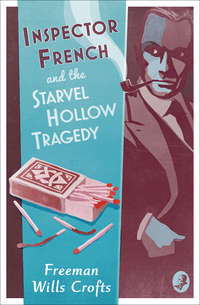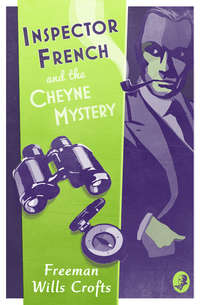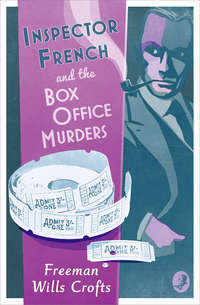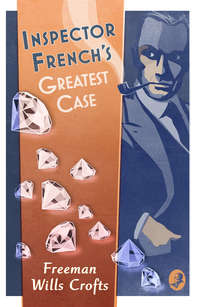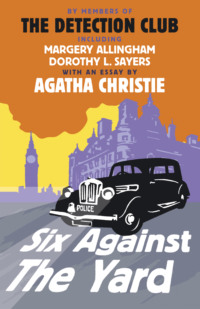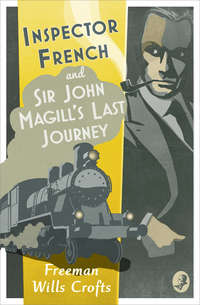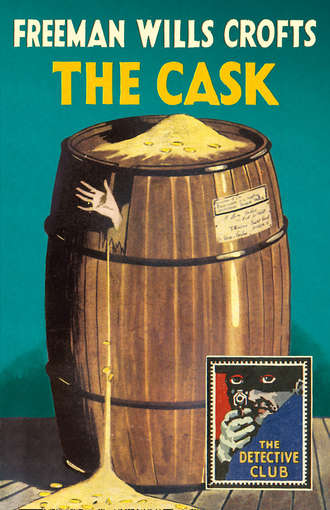
Полная версия
The Cask
With the utmost care he began to climb the side of the summer-house, testing every foothold before trusting his weight on it. Slowly he worked his way up until, cautiously raising his head, he was able to peep over the wall.
The yard was of fair length, stretching from where he crouched to the house, a distance of seventy or eighty feet, but was not more than about thirty feet wide. Along the opposite side it was bounded by a row of out-offices. The large double doors of one of these, apparently a coach-house, were open, and a light shone out from the interior. In front of the doorway and with its back to it stood the dray.
The coach-house being near the far end of the yard, Constable Walker was unable to see what was taking place within. He therefore raised himself upon the wall and slowly and silently crawled along the coping in the direction of the house. He was aware his strategic position was bad, but he reflected that, being on the south-east side of the yard, he had dark sky behind him, while the row of trees would still further blacken his background. He felt safe from observation, and continued till he was nearly opposite the coach-house. Then he stretched himself flat on the coping, hid his face, which he feared might show white if the lantern shone on it, behind the dark sleeve of his reddish brown coat, and waited.
He could now see into the coach-house. It was an empty room of fair size with whitewashed walls and a cement floor. On a peg in the wall hung a hurricane lamp, and by its light he saw the bearded man descending a pair of steps which was placed in the centre of the floor. The wiry man stood close by.
‘That hook’s all right,’ said the bearded man, ‘I have it over the tie beam. Now for the differential.’
He disappeared into an adjoining room, returning in a moment with a small set of chain blocks. Taking the end of this up the steps, he made it fast to something above. The steps were then removed, and Constable Walker could just see below the lintel of the door, the hook of the block with a thin chain sling hanging over it.
‘Now back in,’ said the bearded man.
The dray was backed in until the cask stood beneath the blocks. Both men with some apparent difficulty got the sling fixed, and then pulling on the chain loop, slowly raised the cask.
‘That’ll do,’ said the bearded man when it was some six inches up. ‘Draw out now.’
The wiry man came to the horse’s head and brought the dray out of the building, stopping in front of the yard gate. Taking the lantern from its hook and leaving the cask swinging in mid-air, the bearded man followed. He closed the coach-house doors and secured them with a running bolt and padlock, then crossed to the yard gates and began unfastening them. Both men were now within fifteen feet of Constable Walker, and he lay scarcely daring to breathe.
The wiry man spoke for the first time.
‘’Arf a mo,’ mister,’ he said, ‘what abaht that there money?’
‘Well,’ said the other, ‘I’ll give you yours now, and the other fellow can have his any time he comes for it.’
‘I don’t think,’ the wiry man replied aggressively. ‘I’ll take my pal’s now along o’ my own. When would ’e ’ave time to come around ’ere looking for it?’
‘If I give it to you, what guarantee have I that he won’t deny getting it and come and ask for more?’
‘You’ll ’ave no guarantee at all abaht it, only that I just tells yer. Come on, mister, ’and it over an’ let me get away. And don’t yer go for to think two quid’s goin’ for to settle it up. This ain’t the job wot we expected when we was ’ired, this ain’t. If you want us for to carry your little game through on the strict q.t., why, you’ll ’ave to pay for it, that’s wot.’
‘Confound your impertinence! What the devil do you mean?’
The other leered.
‘There ain’t no cause for you to swear at a poor workin’ man. Come now, mister, you an’ me understands other well enough. You don’t want no questions asked. Ten quid apiece an’ me an’ my pal we don’t know nothin’ abaht it.’
‘My good man, you’ve gone out of your senses. I have nothing to keep quiet. This business is quite correct.’
The wiry man winked deliberately.
‘That’s orl right, mister, I know it’s quite c’rrect. And ten quid apiece’ll keep it that way.’
There was silence for a moment, and the bearded man spoke:
‘You suspect there is something wrong about the cask? Well, you’re wrong, for there isn’t. But I admit that if you talk before Thursday next I’ll lose my bet. See here, I’ll give you five pounds apiece and you may have your mate’s.’ He counted out some coins, chinking them in his hands. ‘You may take it or leave it. You won’t get any more, for then it would be cheaper for me to lose the bet.’
The wiry man paused, eyeing the gold greedily. He opened his mouth to reply, then a sudden thought seemed to strike him. Irresolutely he stood, glancing questioningly at the other. Constable Walker could see his face clearly in the light of the lantern, with an evil, sardonic smile curling his lips. Then, like a man who, after weighing a problem, comes to a decision, he took the money and turned to the horse’s head.
‘Well, mister,’ he said, as he put his vehicle in motion, ‘that’s straight enough. I’ll stand by it.’
The bearded man closed and bolted the yard gates and disappeared with his lantern into the house. In a few seconds the sounds of the receding wheels on the gravel ceased and everything was still.
After waiting a few minutes motionless, Constable Walker slipped off the coping of the wall and dropped noiselessly to the ground. Tiptoeing across to the hedge, he passed silently out of the little gate and regained the lane.
CHAPTER IV
A MIDNIGHT INTERVIEW
THE constable paused in the lane and considered. Up to the present he felt lie, had done splendidly, and he congratulated himself on his luck. But his next step he did not see clearly at all. Should he find the nearest police station and advise the head constable, or should he telephone, or even go to Scotland Yard? Or more difficult still, should he remain where he was and look out for fresh developments?
He paused irresolutely for some fifteen minutes pondering the situation, and had almost made up his mind to telephone for instructions to his own station, when he heard a footstep slowly approaching along the lane. Anxious to remain unseen, he rapidly regained the small gate in the hedge, passed inside, and took up a position behind the trunk of one of the small trees. The sounds drew gradually nearer. Whoever was approaching was doing so exceedingly slowly, and seemed to be coming on tiptoe. The steps passed the place where the constable waited, and he could make out dimly the form of what seemed to be a man of medium height. In a few seconds they stopped, and then returned slowly past the constable, finally coming to a stand close by the little gate. It was intensely still, and the constable could hear the unknown yawning and softly clearing his throat.
The last trace of light had gone from the sky and the stars were showing brightly. There was no wind but a sharpness began to creep into the air. At intervals came the disconnected sounds of night, the bark of a dog, the rustle of some small animal in the grass, the rush of a motor passing on the high road.
The constable’s problem was settled for him for the moment. He could not move while the other watcher remained. He gave a gentle little shiver and settled down to wait.
He began reckoning the time. It must, he thought, be about half-past eight o’clock. It was about eight when the dray had turned into the drive and he was sure half an hour at least must have passed since then. He had leave until ten and he did not want to be late without authority, though surely, under the circumstances, an excuse would be made for him. He began to picture the scene if he were late, the cold anger of the sergeant, the threat to report him, then his explanation, the sudden change of manner …
A faint click of what seemed to be the entrance gate of the drive recalled him with a start to his present position. Footsteps sounded on the gravel, firm, heavy footsteps, walking quickly. A man was approaching the house.
Constable Walker edged round the tree trunk so as to get it between himself and any light that might come from the hall door. The man reached the door and rang.
In a few seconds a light appeared through the fanlight, and the door was opened by the bearded man. A big, broad-shouldered man in a dark overcoat and soft hat stood on the steps.
‘Hallo, Felix!’ cried the newcomer heartily. ‘Glad to see you’re at home. When did you get back?’
‘That you, Martin? Come in. I got back on Sunday night.’
‘I’ll not go in, thanks, but I want you to come round and make up a four at bridge. Tom Brice is with us, and he has brought along a friend of his, a young solicitor from Liverpool. You’ll come, won’t you?’
The man addressed as Felix hesitated a moment before replying.
‘Thanks, yes. I’ll go, certainly. But I’m all alone and I haven’t changed. Come in a minute till I do so.’
‘And, if it’s a fair question, where did you get your dinner if you’re all alone?’
‘In town. I’m only just home.’
They went in and the door was closed. Some few minutes later they emerged again and, pulling the door behind them, disappeared down the drive, the distant click of the gate signifying their arrival at the road. As soon as this sounded, the watcher in the lane moved rapidly, though silently, after them, and Constable Walker was left in undisputed possession.
On the coast becoming clear he slipped out on to the lane, walked down it to the road and turned back in the direction of London. As he did so a clock struck nine.
Entering the first inn he came to, he called for a glass of ale and, getting into conversation with the landlord, learnt that he was near the hamlet of Brent, on the Great North Road, and that Mr Felix’s house was named St Malo. He also inquired his way to the nearest public telephone, which, fortunately, was close by.
A few minutes later he was speaking to Scotland Yard. He had to wait for a little time while Inspector Burnley, who had gone home, was being fetched, but in fifteen minutes he had made his report and was awaiting instructions.
The Inspector questioned him closely about the position of the house, finally instructing him to return to his post behind the tree and await developments.
‘I will go out with some men now, and will look for you by the little gate in the hedge.’
Constable Walker walked rapidly back, and as he did so the same clock struck ten. He had been gone exactly an hour. In the meantime, Inspector Burnley got a taxi and, after a careful examination of his route and the district on a large-scale map, started for St Malo with three other men. He called on his way at Walpole Terrace, Queen Mary Road, where Tom Broughton lived, and delighted that young man by inviting him to join the party. On the way, he explained in detail the lie of the house and grounds, where he wanted each man to stand, and what was to be done in various eventualities. The streets were full of people and motoring was slow, but it was still considerably before eleven when they entered the Great North Road.
They ran on till the Inspector judged they were not far from the house, when the car was run up a side road and the engine stopped. The five men then walked on in silence.
‘Wait here,’ whispered Burnley, when they had gone some distance, and slipped away into the dark. He found the lane, walked softly down it until he came to the little gate, slipped inside and came up to Constable Walker standing behind his tree.
‘I’m Inspector Burnley,’ he whispered. ‘Has any one come in or out yet?’
‘No, sir.’
‘Well, wait here until I post my men.’
He returned to the others and, speaking in a whisper, gave his directions.
‘You men take up the positions I explained to you. Listen out for a whistle to close in. Mr Broughton, you come with me and keep silent.’
The Inspector and his young acquaintance walked down the lane, stopping outside the little gate. The other three men posted themselves at various points in the grounds. And then they waited.
It seemed to Broughton that several hours must have passed when a clock in the distance struck twelve. He and the Inspector were standing beside each other concealed under the hedge. Once or twice he had attempted whispered remarks, but Burnley was not responsive. It was rather cold and the stars were bright. A light breeze had risen and it rustled gently through the hedge and stirred the branches of the trees. An insistent dog was barking somewhere away to the right. A cart passed on the road, the wheels knocking on their axles annoyingly. It took ages to get out of earshot, the sounds coming in rotation through nearly a quarter of the compass. Then a car followed with a swift rush, the glare of the headlights glancing along through the trees. And still nothing happened.
After further ages the clock struck again—one. A second dog began barking. The breeze freshened, and Broughton wished he had brought a heavier coat. He longed to stamp up and down and ease his cramped limbs. And then the latch of the road gate clicked and footsteps sounded on the gravel.
They waited motionless as the steps came nearer. Soon a black shadow came into view and moved to the hall door. There was a jingling of keys, the rattling of a lock, the outline of the door became still darker, the shadow disappeared within and the door was closed.
Immediately Burnley whispered to Broughton:
‘I am going now to ring at the door, and when he opens it I will flash my light in his face. Take a good look at him and if you are sure—absolutely positive—it is Felix, say “yes”, just the one word “yes”. Do you understand?’
They went in through the small gate, no longer taking any precautions against noise, walked to the door, and Burnley knocked loudly.
‘Now, remember, don’t speak unless you are sure,’ he whispered.
A light flickered through the fanlight and the door was opened. A beam from the Inspector’s dark lantern flashed on the face of the man within, revealing the same dark complexion and black beard that had attracted Constable Walker’s attention. The word ‘Yes’ came from Broughton and the Inspector said:
‘Mr Léon Felix, I am Inspector Burnley from Scotland Yard. I have called on rather urgent business, and would be glad of a few minutes’ conversation.’
The black-bearded man started.
‘Oh, certainly,’ he said, after a momentary pause, ‘though I don’t know that it is quite the hour I would have suggested for a chat. Will you come in?’
‘Thanks. I’m sorry it’s late, but I have been waiting for you for a considerable time. Perhaps my man might sit in the hall out of the cold?’
Burnley called over one of his men who had been stationed near the summer-house.
‘Wait here till I speak to Mr Felix, Hastings,’ he said, giving him a sign to be ready if called on. Then, leaving Broughton outside with Constable Walker and the other men, he followed Felix into a room on the left of the hall.
It was fitted up comfortably though not luxuriously as a study. In the middle of the room stood a flat-topped desk of modern design. Two deep, leather-covered arm-chairs were drawn up on each side of the fireplace, in which the embers still glowed. A tantalus stood on a small side table with a box of cigars. The walls were lined with bookshelves with here and there a good print. Felix lighted a reading-lamp which stood on the desk. He turned to Burnley.
‘Is it a sitting down matter?’ he said, indicating one of the arm-chairs. The Inspector took it while Felix dropped into the other.
‘I want, Mr Felix,’ began the detective, ‘to make some inquiries about a cask which you got from the steamer Bullfinch this morning—or rather yesterday, for this is really Tuesday—and which I have reason to believe is still in your possession.’
‘Yes?’
‘The steamboat people think that a mistake has been made and that the cask that you received was not the one consigned to you, and which you expected.’
‘The cask I received is my own property. It was invoiced to me and the freight was paid. What more do the shipping company want?’
‘But the cask you received was not addressed to you. It was invoiced to a Mr Felix of West Jubb Street, Tottenham Court Road.’
‘The cask was addressed to me. I admit the friend who sent it made a mistake in the address, but it was for me all the same.’
‘But if we bring the other Mr Felix—the West Jubb Street Mr Felix—here, and he also claims it, you will not then, I take it, persist in your claim?’
The black-bearded man moved uneasily. He opened his mouth to reply, and then hesitated. The Inspector felt sure he had seen the little pitfall only just in time.
‘If you produce such a man,’ he said at last, ‘I am sure I can easily convince him that the cask was really sent to me and not to him.’
‘Well, we shall see about that later. Meantime, another question. What was in the cask you were expecting?’
‘Statuary.’
‘You are sure of that?’
‘Why, of course I’m sure. Really, Mr Inspector, I’d like to know by what right I am being subjected to this examination.’
‘I shall tell you, Mr Felix. Scotland Yard has reason to believe there is something wrong about that cask, and an investigation has been ordered. You were naturally the first person to approach, but since the cask turns out not to be yours, we shall—’
‘Not to be mine? What do you mean? Who says it is not mine?’
‘Pardon me, you yourself said so. You have just told me the cask you expected contained statuary. We know the one you received does not contain statuary. Therefore you have got the wrong one.’
Felix paled suddenly, and a look of alarm crept into his eyes. Burnley leant forward and touched him on the knee.
‘You will see for yourself, Mr Felix, that if this matter is to blow over we must have an explanation of these discrepancies. I am not suggesting you can’t give one. I am sure you can. But if you refuse to do so you will undoubtedly arouse unpleasant suspicions.’
Felix remained silent, and the Inspector did not interrupt his train of thought.
‘Well,’ he said at length, ‘I have really nothing to hide, only one does not like being bluffed. I will tell you, if I can, what you want to know. Satisfy me that you are from Scotland Yard.’
Burnley showed his credentials, and the other said:
‘Very good. Then I may admit I misled you about the contents of the cask, though I told you the literal and absolute truth. The cask is full of plaques—plaques of kings and queens. Isn’t that statuary? And if the plaques should be small and made of gold and called sovereigns, aren’t they still statuary? That is what the cask contains, Mr Inspector. Sovereigns. £988 in gold.’
‘What else?’
‘Nothing else.’
‘Oh, come now, Mr Felix. We knew there was money in the cask. We also know there is something else. Think again.’
‘Oh, well, there will be packing, of course. I haven’t opened it and I don’t know. But £988 in gold would go a small way towards filling it. There will be sand or perhaps alabaster or some other packing.’
‘I don’t mean packing. Do you distinctly tell me no other special object was included?’
‘Certainly, but I suppose I’d better explain the whole thing.’
He stirred the embers of the fire together, threw on a couple of logs and settled himself more comfortably in his chair.
CHAPTER V
FELIX TELLS A STORY
‘I AM a Frenchman, as you know,’ began Felix, ‘but I have lived in London for some years, and I run over to Paris frequently on both business and pleasure. About three weeks ago on one of these visits I dropped into the Café Toisson d’Or in the rue Royale, where I joined a group of acquaintances. The conversation turned on the French Government lotteries, and one of the men, a M. Le Gautier, who had been defending the system, said to me, “Why not join in a little flutter?” I refused at first, but afterwards changed my mind and said I would sport 500 francs if he did the same. He agreed, and I gave him £20 odd as my share. He was to carry the business through in his name, letting me know the result and halving the profits, if any. I thought no more about the matter till last Friday, when, on my return home in the evening, I found a letter from Le Gautier, which surprised, pleased, and annoyed me in equal measure.’
Mr Felix drew a letter from a drawer of his writing-table and passed it to the Inspector. It was in French, and though the latter had a fair knowledge of the language, he was not quite equal to the task, and Mr Felix translated. The letter ran as follows:
‘Rue de Vallorbes, 997,
‘Avenue Friedland,
‘Paris.
‘Thursday, 1st April, 1912.
‘MY DEAR FELIX,—I have just had the most wonderful news! We have won! The lottery has drawn trumps and our 1000 francs has become 50,000–25,000 francs each! I shake both your hands!
‘The money I have already received, and I am sending your share at once. And now, old chap, do not be very annoyed when I tell you I am playing a little trick on you. I apologise.
‘You remember Dumarchez? Well, he and I had an argument about you last week. We were discussing the ingenuity and resource of criminals in evading the police. Your name happened to be mentioned, and I remarked what a splendid criminal a man of your inventive talents would make. He said “No,” that you were too transparently honest to deceive the police. We got hot about it and finally arranged a little test. I have packed your money in a cask, in English sovereigns—there are 988 of them—and am booking it to you, carriage paid, by the Insular and Continental Steam Navigation Company’s boat from Rouen, due in London about Monday, 5th April. But I am addressing it to “M. Léon Felix, 141 West Jubb Street, Tottenham Court Road, London, W.,” and labelling it “Statuary only,” from Dupierre et Cie., the monumental sculptors of Grenelle. It will take some ingenuity to get a falsely addressed and falsely described cask away from the steamer officials without being suspected of theft. That is the test. I have bet Dumarchez an even 5000 francs that you will do it. He says you will certainly be caught.
‘I send you my best congratulations on the greatness of your coup, of which the visible evidence goes to you in the cask, and my only regret is that I shall be unable to be present to see you open it.
‘With profound apologies,
‘Yours very truly,
‘ALPHONSE LE GAUTIER.
‘PS.—Please excuse the typewriter, but I have hurt my hand.’
‘I don’t know whether pleasure at the unexpected windfall of nearly £1000, or annoyance at Le Gautier’s test with the cask was my strongest emotion. The more I thought of this part of it, the more angry I became. It was one thing that my friends should amuse themselves by backing their silly theories, it was quite another that I should be the victim and scapegoat of their nonsense. Two things obviously might lead to complications. If it came out that a cask labelled “Statuary” contained gold, suspicion would be aroused, and the same thing would happen if any one discovered the address to be false. The contents of the cask might be questioned owing to the weight—that I did not know; the false address might come to light if an advice note of the cask’s arrival was sent out, while there was always the fear of unforeseen accidents. I was highly incensed, and I determined to wire early next morning to Le Gautier asking him not to send the cask, and saying I would go over and get the money. But to my further annoyance I had a card by the first post which said that the cask had already been despatched.
‘It was clear to me then that I must make arrangements to get it away as soon as possible after the boat came in, and before inquiries began to be made. I accordingly made my plans and, as I did so, my annoyance passed away and I got interested in the sporting side of the affair. First, I had a few cards of the false address printed. Then I found an obscure carting contractor, from whom I hired a four-wheeled dray and two men, together with the use of an empty shed for three days.


